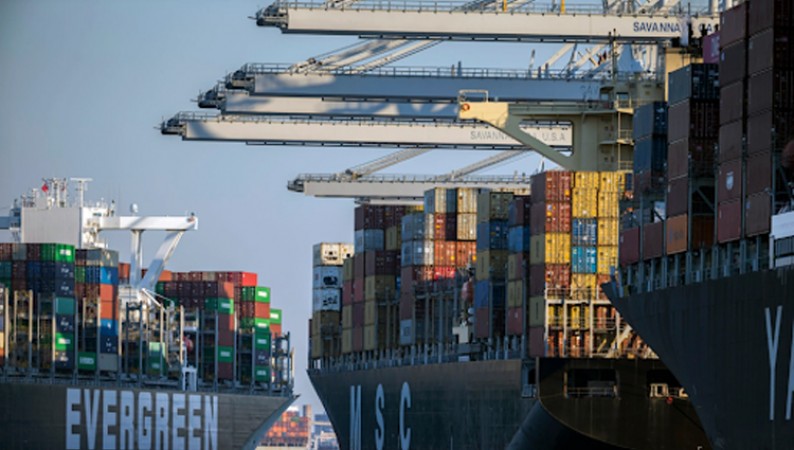
United States: Part of Washington's punitive tariffs on the four-year expiration date of Chinese imports passed on Tuesday, levying a 25% tax on nearly US$16 billion worth of goods, despite bipartisanship from US President Joe Biden's administration .
Former US President Donald Trump presented four lists of additional tariffs on Chinese imports. List 1 took effect on July 6, 2018 and covers US$34 billion of Chinese products used to manufacture machinery and aircraft parts. List 2 is in effect for the next four years starting Tuesday and covers US$16 billion in goods ranging from construction to automobiles.
Due to "massive" trade deficits and "unfair" trade practices, the US imposed sanctions on Chinese imports totaling US$300 billion by 2019, according to all four lists.
On May 5, the Office of the US Trade Representative began a review of two sets of tariffs and sought their opinion from representatives of domestic industries. By the August 23 deadline for List 2, 152 submissions had been received in support of raising those tariffs, and more than 300 requests were made to keep List 1 tariffs as well.
According to a notice published in the USTR Federal Register, if USTR receives a single request to keep them, the tariffs will automatically renew.
According to Nicole Bivens Collinson, who heads international business and government relations at Sandler, Travis & Rosenberg, a Washington-based law firm, existing rules under Section 301 of the 1974 Business Act require the government to assess whether Was there a profit from the tariff imposed? American after four years.
“We anticipate that the tariffs will remain in place, and the USTR will issue another Federal Register notice,” Bivens Collinson said. "This time, the USTR will seek comments from entities that were harmed by the implementation or maintenance of the tariffs."
After taking office last year, Biden indicated he was not keen on repealing Trump-era import taxes. However, as inflation hit a 40-year high of 8.6 percent this year, rumors spread that the White House was considering a relief package.
Bivens Collinson expressed optimism that future tariff relief will be determined by economic factors rather than the USTR review.
"The Biden administration may decide to take additional actions on specific, possibly consumer products, that complement the expected effects from the Inflation Reduction Bill 2022," Bivens Collinson said.
Consumers in the United States are paying higher prices for rising prices. The Peterson Institute for International Economics calculated earlier this year that reducing tariffs would save American households an average of $797 per year.
In addition to these views, US House Speaker Nancy Pelosi's high-profile visit to Taiwan, a self-governing island that China claims as its own, further strained US-China relations. As a result of the visit, Beijing has suspended cooperation with Washington on a range of issues, including climate change, maritime consultations and illegal drugs.
Following Pelosi's visit, US Commerce Secretary Gina Raimondo acknowledged that the visit was "particularly complicated" by pre-existing tensions with China. "Certainly, it has made it a little more difficult," Raimondo said.
The Biden administration has indicated recently that it is divided on supporting tariff relief. Treasury Secretary Janet Yellen testified in Congress in July that some tariffs were "paid for by the Americans, not by the Chinese", but US Trade Representative Catherine Tai argued that the "China tariff" was an important piece of leverage, and A business negotiator never walks away with leverage."
According to Gerard DiPipo, a senior fellow at the Center for Strategic and International Studies for Biden, who has felt pressure from labor unions and Democratic candidates for the upcoming midterm elections, the only "compelling reason" for sticking with tariffs is to avoid . no political consequences.
Democratic nominee for US Senate Tim Ryan did not appear on stage with Biden due to a "scheduling conflict" during his visit to the battlefield in Ohio in July. Ryan, running against Trump-backed Republican JD Vance, has urged the White House to keep the tariffs. Trump, who is still very powerful in the Republican Party, has repeatedly attacked Biden for being "weak on China," a label that could cost Democrats in November.
Morning Consult, a firm specializing in online survey research technology, found that only 51% of Republicans supported keeping the tariffs, the lowest level of support in six months. Meanwhile, 44% of Democrats wanted Biden to undercut them, with many citing a desire to stop consumer goods prices from rising.
The US-China trade deficit grew 14.5% year over year in 2021, according to Commerce Department data released in February.
Can Covid-19 be eliminated? no not at all according to CDC chief Dr. Anthony Fauci
No charges filed against the white police officers who fatally shot Black man
"Ukraine born again" Zelensky mentions this In his speech on Independence Day